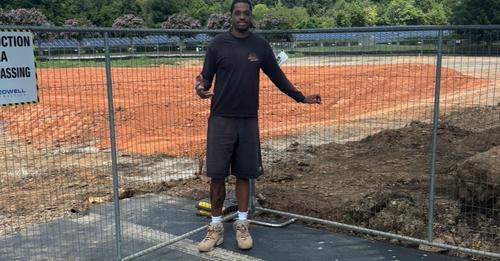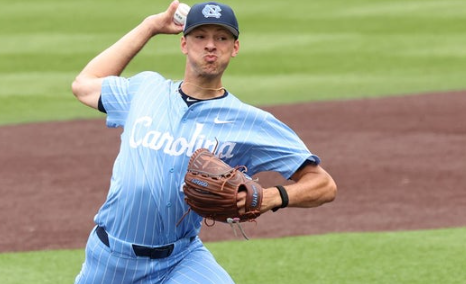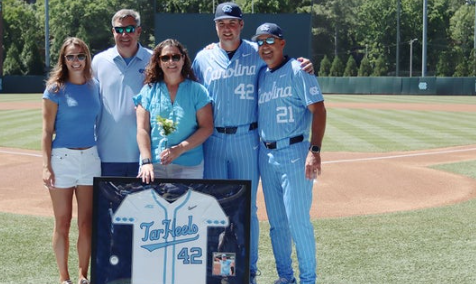
Armando Bacot, the former University of North Carolina basketball player, has announced the groundbreaking of his first hotel project. The 24-year-old has partnered with ATMA Hotel Group, a North Carolina-owned and operated company, to develop a multi-story Home2 Suites by Hilton at Raleigh Crabtree Valley off Glenwood Avenue.
Bacot shared his excitement about this venture on social media, stating, “First Hotel on the way super excited and blessed. Shout out to ATMA Hotel Group for assisting me… First of many more (on the way).”
ATMA Hotel Group currently owns and operates nine properties across North Carolina, including the Courtyard by Marriott in downtown Chapel Hill, the Tru by Hilton off Fordham Boulevard, and the Holiday Inn Express and Hampton Inn & Suites on Farrington Road. The company also manages the Hampton Inn & Suites in Carrboro.
This project marks Bacot’s foray into the hospitality industry and showcases his entrepreneurial spirit. As a former standout player for the University of North Carolina, Bacot has now transitioned to pursuing business opportunities outside of basketball.
The specifics of the partnership between ATMA Hotel Group and Armando Bacot remain unclear, but the former UNC basketball star revealed that he earned a “life-changing” amount of money through NIL deals during his five years at Chapel Hill. Bacot, a two-time All-American, launched a merchandise store, secured multiple sponsorship agreements, and appeared in a Netflix series after the NCAA introduced new NIL regulations on July 1, 2021. In a recent interview with Theo Pinson on the “Run Your Race” podcast, he disclosed that he made over $2 million.
“I had no idea,” Bacot said about the introduction of NIL during his college career. “I went from making nothing to becoming a millionaire quickly. It was surreal. We didn’t realize it. I earned over $2 million, and I say that humbly. This reflects the brand of North Carolina. If I hadn’t attended North Carolina, I wouldn’t have landed deals with TurboTax and others.”
How NIL Contracts Benefit UNC Baseball.
When the NCAA approved its first name, image, and likeness (NIL) policy on June 30, 2021, traditionalists in college athletics expressed concern over the potential decline of the amateur model that had long linked academics and sports at universities. The idea of student-athletes securing million-dollar contracts and prioritizing their lifestyles over their athletic performance unsettled many skeptics. However, the media’s focus on high-profile NIL deals for top college football and men’s basketball prospects often overshadowed the advantages this legislation could bring to the majority of student-athletes, who are primarily interested in covering tuition and meeting basic needs.
The NCAA’s interim policy was a response to state legislatures eager to act and was quickly assembled with minimal guidance, consisting of just three rules: (1) no pay-for-play, (2) no improper inducements tied to a specific school, and (3) no compensation for athletic participation or achievements. This chaotic environment raised concerns about the future of college athletics, but over the past three years, there has been a gradual establishment of NIL processes. In April, the NCAA Division I Board of Directors allowed member institutions to identify NIL opportunities and facilitate deals between student-athletes and third parties. This led to the creation of Carolina NIL, a collaborative initiative that unites Carolina athletics, The Rams Club, the N.C. Hall of Fame, and Old Well Management.
Old Well Management, which expanded upon previous collectives like Heels4Life and Secondary Break Club, manages NIL negotiations for UNC’s 28 sports teams. Less than two months after the NCAA rule change, UNC’s baseball team finished its season at the College World Series in Omaha, and Old Well Management was prepared to begin negotiations upon their return.
With the Major League Baseball Draft scheduled for mid-July, there was ample time after the season ended to start discussions with players. The initial phase of this process began months earlier when Kevin Rice, executive director of the N.C. Hall of Fame and now with Old Well Management, met with head coach Scott Forbes to discuss priorities for roster building and retention. Comprehensive evaluations were conducted for all draft-eligible student-athletes, using mock drafts to estimate their likely positions. This assessment is crucial, as the MLB’s slotting system assigns monetary values to each draft position. Players not selected in the draft can sign free agent contracts funded by the remaining draft budget.
Historically, college coaches have been the primary source for student-athletes seeking to understand their professional value. While these discussions remain vital, the emergence of NIL collectives has added a new dimension to the conversation.
“Coaches can’t engage in actual negotiations regarding numbers and deal structures, but it’s essential for them to have open discussions with players about their thoughts,” Rice explained. “Especially in baseball, where draft slot values exist, players can communicate their intentions, such as, ‘Coach, if I get drafted and receive this offer, I’m likely to go.’ These conversations were already happening pre-NIL, and they remain important for aligning our understanding of the player’s mindset and budgeting for potential impacts.”
There is no illusion that the current NIL framework will persuade top baseball prospects to remain in school rather than turn professional. The financial incentives simply do not match the resources of major league teams. For instance, Tar Heel outfielder Vance Honeycutt was drafted by the Baltimore Orioles as the 22nd overall pick and received a $4 million signing bonus, making a six-figure NIL deal irrelevant to his decision.
“My hope is that these players recognize they don’t have to rush into signing,” Forbes stated. “We want all our players to reach the major leagues, as that’s their dream. There may be situations where it’s time for them to start their professional careers, but we don’t want them to feel forced to do so purely for financial reasons, unless it’s a no-brainer like Vance Honeycutt.”
College football programs at the FBS level offer 85 scholarships each season, while men’s basketball programs have 13. College baseball, however, operates differently, with only 11.7 scholarships available for a roster of 35 players. Coaching staffs must allocate these scholarships to ensure they can attract enough talent, especially for players facing out-of-state tuition costs, to maintain competitive teams.
“Certain sports are not classified as headcount sports, meaning the number of players does not equal the number of scholarships,” Rice noted. “In these sports, coaches struggle to decide how to distribute scholarships among key players. Fans might be surprised to learn that many quality players leave college with debt because their sport doesn’t provide full scholarships for everyone. This highlights the importance of supporting NIL initiatives, which differ significantly from the extravagant portrayals often seen in the media. This support has a tangible and significant impact on the lives of these athletes.”
Forbes is dedicated to maximizing NIL opportunities as a means to fund scholarships for his players, aiming to help them eliminate their student debt before graduation.
Junior right-handed pitcher Aidan Haugh joined the weekend rotation in April and seized his chance by making eight starts, averaging 10.2 strikeouts per nine innings. His strong late-season performance boosted his draft stock, and after the season concluded, professional scouts began reaching out to him. Haugh mentioned that he initially expected to sign a professional contract before the August 1 deadline. To prepare him for a potential return to UNC for his senior year, Old Well Management initiated NIL discussions about a week prior to the draft, ensuring Haugh had everything in place.

Aidan Haugh was chosen by the Minnesota Twins as the 488th overall pick in the 16th round. That evening, the Twins reached out to the East Wake High School graduate to present their offer, initiating negotiations for his professional career. However, when Minnesota returned with their final offer a couple of weeks later, the two parties were not close enough to finalize a deal.
Aidan Haugh, the right-handed pitcher drafted by the Minnesota Twins in the 16th round, cited NIL as a key factor in his decision to potentially return to UNC for his senior season. Haugh acknowledged that with NIL, he knows he will receive some form of financial assistance if he comes back to Chapel Hill, allowing him to turn down less favorable professional contract offers.
Haugh’s NIL contract is a one-year deal that includes responsibilities such as community service events, appearances, and social media engagement. Carolina NIL provides guidance and support to help student-athletes execute the details of their NIL contracts.
Jake Knapp, the team captain and expected Friday night starter for UNC in 2024, suffered a torn ulnar collateral ligament in his right elbow in late January. Despite lacking scholarship money, Knapp decided to return for his fifth collegiate season in 2024 due to NIL assistance covering his tuition. After the draft, several teams expressed interest in signing Knapp, but he ultimately chose to return to UNC for the 2025 season.
“I’m not over here buying a new truck or anything, but I don’t have to pay for school or take out student loans,” Knapp said. “Coming back to school as an older guy is much more feasible than where in the past, if you come back, you’re going to have to pay for school, and you don’t necessarily know what you’re going to get going forward in the draft. It bridges that gap of needing to take this money while I can get it in the draft, whereas now you don’t have to do that.”
Knapp’s decision was also influenced by his desire to rehab his injury at UNC, where he has a strong relationship with the head athletic trainer and access to top-notch facilities. He began throwing in late July and aims to return to the mound in late January or February.
Kevin Rice, executive director of the N.C. Hall of Fame and part of Old Well Management, emphasized that NIL is just one factor among many when considering going pro, transferring, or returning to school. In Knapp’s case, the best place to fully recover, regain playing time, and potentially improve his draft position was to come back to UNC.

NIL Helps UNC Baseball Players Make Informed Decisions.
UNC baseball coach Scott Forbes believes that NIL opportunities can help players like Jake Knapp and Aidan Haugh make informed decisions about their futures. Both players are considering returning to Chapel Hill for another season.
When a player suffers an injury like Knapp’s torn elbow ligament, it adds another factor to consider in the decision-making process. NIL provides financial viability that can make staying at UNC more attractive, especially when factors like rehab and regaining confidence are better suited in Chapel Hill.
“If the other factors, like rehab and the ability to play and grow in confidence again, is better suited here, we can make that financially viable for Jake and for players in that situation moving forward,” Forbes explained.
From a coaching perspective, Forbes believes both Knapp and Haugh will benefit from returning to UNC for one more season. While he projects them as future pros, Knapp is coming off an injury, while Haugh is still developing his talent.
Initially, Forbes thought Knapp and Haugh would benefit more from turning pro. However, the ability to offset potential professional earnings through NIL makes staying at UNC even more appealing.
“At first it was like, I think you’re going to benefit more, but then, well, if you can almost offset this amount that you would potentially get or make professionally, it makes even more sense,” Forbes said.
NIL has provided Knapp and Haugh with more options as they weigh their futures. It allows them to make decisions based on factors like rehab, confidence, and continued growth, knowing they can still earn significant income through NIL deals if they return to Chapel Hill. This flexibility is a valuable tool for players navigating the difficult choice between college and professional baseball.
Changing the Narrative on NIL at UNC.
While Old Well Management works to provide NIL opportunities to UNC baseball players and help bridge the scholarship gap, Carolina NIL and the university as a whole face the challenge of changing the public perception of NIL. The goal is to shift the narrative from viewing NIL as a corrupt system aimed at excessively paying players to seeing it as a means to better support student-athletes.
Old Well Management, which handles NIL negotiations for UNC’s 28 sports teams, has been instrumental in securing deals that help alleviate the financial burden for players, particularly in sports like baseball where scholarships are limited. By facilitating NIL contracts, Old Well Management enables players to cover tuition costs and avoid student debt, allowing them to focus on their education and athletic pursuits.
However, the university recognizes that the broader public discourse surrounding NIL often portrays it in a negative light, associating it with improper inducements and the commercialization of college sports. Carolina NIL and UNC aim to reframe this narrative by highlighting how NIL can be leveraged to better support student-athletes holistically.
The university emphasizes that NIL deals are not about paying players exorbitant sums but rather providing them with opportunities to earn income that can enhance their overall college experience. By covering educational expenses, NIL helps student-athletes avoid financial stress and allows them to prioritize their academic and athletic development.
Furthermore, UNC stresses that NIL deals are not a replacement for scholarships but rather a complementary tool to ensure student-athletes can thrive both on and off the field. The university remains committed to providing robust scholarship support while also embracing NIL as a means to further support its student-athletes.
By actively engaging in this narrative shift, UNC aims to showcase how NIL can be implemented responsibly and ethically, focusing on the well-being and success of student-athletes. This approach seeks to counter the negative perceptions surrounding NIL and demonstrate its potential to positively impact the lives of student-athletes at UNC and beyond.

Leave a Reply